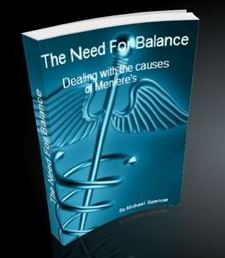The Problem with Supplements for Meniere’s disease
Table of Contents
Why some supplements may help you reduce your symptoms, while others may harm you

If you have ever searched for supplements to help reduce your Meniere’s symptoms, or for any other reason, you may have read the term ” Not all supplements are created equal”.
In recent years the focus of Menieres-Help.Com has been very much on identifying the root causes of Meniere’s symptoms and eliminating those causes and hopefully the symptoms from the sufferers life
We have always concentrated on triggers but in the formative years of this site being active we spread the word as much as we could about the concept of the right nutrition enabling sufferers to live free from symptoms and live a healthy normal life. This involves possible changes in diet, lifestyle and supplementing with quality nutriceuticals.
We have always put large emphasis on the word “quality” for good reason. Over a decade ago when we first started spreading the word about the supplements we use there was a lot substandard supplement products on the shelves of so called health food stores, supermarkets, high street pharmacies and spread all over the internet. You have to say it has gotten worse these days.
The US market is being flooded with supplements made in China that may have, shall we say, some ‘dubious’ ingredients.
That is not say China is any worse than the US, UK or other western countries. In fact there has always been a proliferation of these products that belong in the garbage can rather than in our stomachs. It is just now its even worse.
Moreover there are now reports of illegal copies of quality brands being shipped in from China and being sold online.
There are some fantastic products and brands out there but there are a whole lot more that are, ‘questionable’ to say the very least.
Way back in 2004 I checked the index chart results of independent quality testing for over a thousand products in the US, UK and Canada. In an index score of 300, most high street brands scores were pitifully low. One of the most popular brands in the UK at the time scored just 15 (out of 300!!) Another brand that most people would trust from the name alone scored a pitiful 5!!
The supplements we have been using with such success for over a decade scored the maximum 300. If you think about this, it make perfect sense why the results people get when using supplementation is so varied. In terms of controlling Meniere’s symptoms, some see no improvement at all, some see partial improvement while others live completely free of their symptoms. It simply depends on what you use and the quality of what you use. Indeed, all supplements are NOT created equal.
The tests mentioned above were done by ‘Nutrisearch’ and published in their Comparative Guide Nutritional Supplements. The most recent edition was published in 2017: NutriSearch Comparative Guide to Nutritional Supplements for the Americas (English). Not only do they publish their results but also give a thorough explanation of the importance of diet and nutrition to health and explain the relationship of oxidative stress and inflammation with the onset of disease and how what you eat and supplement with can prevent this.
For the 2015 edition their summary is as follows:
“The central roles of oxidative stress and inflammation in the onset of chronic degenerative disease are explained. The preventive roles of dietary antioxidants are discussed. The fundamental question of why we need to supplement is answered. The importance of supplementation with two ancient antioxidants, vitamin D and iodine, is highlighted.”
Why not all supplements are created equal
According to Dr Edward Group of the Global Healing Center in Texas,
“What people are not aware of is all vitamins are not created equal, and most are actually synthetic.“
He goes on to say,
“A healthy, organic diet should provide a good amount of nutrients that the body needs, but supplements can help ensure that we are getting a healthy serving of specific vitamins.
The problem is that many vitamin and mineral supplements are manufactured synthetically with chemicals and do not come straight from their natural sources. They are made to mimic the way natural vitamins act in our bodies. Natural vitamins are derived directly from plant material containing the vitamin, not produced in a test tube.
Many synthetic vitamins lack the transporters and co-factors associated with naturally occurring vitamins because they have been “isolated.” The Organic Consumers Association emphasizes that isolated vitamins cannot be used or recognized by the body in the same way as the natural version.
The natural form come in packages with other vitamins, enzymes and minerals that control the way the body recognizes, metabolizes and uses them to make what it needs.
Isolated vitamins can’t always be used by the body, and are either stored until you obtain or create the nutrients required to use them effectively or are excreted. Synthetic vitamins are also devoid of necessary trace minerals and must use the body’s own mineral reserves which may lead to dangerous mineral deficiencies.”
It is believed that today more than 95% of all the vitamin supplements sold are synthetic. When genuine quality supplements can do so much good, this proliferation both gives the concept of supplementation a bad name and puts many people off the idea due to poor results and bad press.
Synthetic vitamins contain chemical compounds that were not meant for human consumption and do not occur in nature.
Dr Group says,
“Fat soluble vitamins in their synthetic form are especially dangerous because they can build up in your fatty tissues and cause toxicity. The reason that the synthetic form is more dangerous is because you get a high, concentrated serving of the vitamin rather than the amount that you would get from a food-based form.”
- Vitamins A, D, E and K are all fat soluble
- Fat soluble vitamins are found naturally in butter, fish oils, nuts, and green leafy vegetables
- Excesses of fat soluble vitamins are stored in the liver and fatty tissues
- Most people do not get sufficient amounts of fat soluble vitamins from their diet
Supplement manufacturing does not come under the same strict regulations as pharmaceuticals so there is a lot of room to fool the consumer with misleading labels and ingredient lists.
The label may state “natural” but in fact this is often not the case. The vitamins only have to be 10% natural for the manufacturer to able to label their product “natural”, meaning 90% of what you are consuming may be actually synthetic!
Dr Group insists that most Vitamin C and B Vitamin supplements are synthetic.
Organic Consumers Association – Natural Vs Synthetic vitamins
The Organic Consumers Association published an ingredient chart to help consumers identify natural vs. synthetic vitamins. Check the labels when you buy and avoid these synthetic versions.
- Vitamin A: Retinyl Palmitate
- Vitamin B1 (Thiamine): Thiamine Mononitrate, Thiamine Hydrochloride
- Vitamin B2 (Riboflavin): Riboflavin
- Pantothenic Acid: Calcium D-Pantothenate
- Vitamin B6 (Pyridoxine): Pyridoxine Hydrochloride
- Vitamin B12: Cyanocobalamin
- PABA (Para-aminobenzoic Acid): Aminobenzoic Acid
- Folic Acid: Pteroylglutamic Acid
- Choline: Choline Chloride, Choline Bitartrate
- Biotin: d-Biotin
- Vitamin C (Ascorbic Acid): Ascorbic Acid
- Vitamin D: Irradiated Ergosteral, Calciferol
- Vitamin E: dl-alpha tocopherol, dl-alpha tocopherol acetate or succinate
Note that the “dl” form of any vitamin is synthetic.
When you wonder about the huge disparity in the prices of some supplements. Supplements with all natural ingredients are produced by manufacturers who take great care in the process in which they extract nutrients and put the the supplements together. A few of the best companies choose to be regulated to pharmaceutical standards to ensure consumer confidence in the safety, potency and quality of their supplements.
Cheaper brands often have either useless or harmful fillers and binders in them. The consumer believes they are supporting or boosting their immune system and general health but in fact may be consuming toxic materials instead.
Avoid supplements with these toxic ingredients:
- Magnesium stearate (or stearic acid)
- Monosodium Glutamate (MSG) disguised as “natural flavors”
- Carnauba wax is used in car wax and shoe polish
- Titanium dioxide is a carcinogen
On the one hand this information makes you realize why some people do not trust supplements and on the other makes me wonder how many people have tried cheap substandard brands and either gotten more sick or had no benefit whatsoever.
In both cases people have lost the opportunity to truly support their immune system adequately to enable it to deal with the inflammation causing their symptoms. They will have wasted time and money and ended up dismissing the very notion that nutrition actually matters so much. More importantly they will have continued to suffer needlessly.
I find this very frustrating and sad.
At the end of the day, although there are other important aspect to reducing your symptoms, the quality of supplements you might use, not only matters but can be vital in managing your Meniere’s symptoms and your general health.
If you found this article useful Click here to support Meniere’s Help paypal.me/menieres
By Mike Spencer
Founder of Meniere’s Help – Supporting sufferers since 2004
Researcher and author of Managing Meniere’s Disease
and The Need for Balance – Dealing with Causes of Meniere’s
Help other Meniere’s sufferers
What is your experience with supplementation and Meniere’s – good or bad? Tell us all about it in the comments box below or email Mike at meniereshelp@gmail.com
References/Further reading:








Reader Comments
I just want help.plz
Hi Ettie, I have sent you an email. Contact me anytime you want. meniereshelp@gmail.com